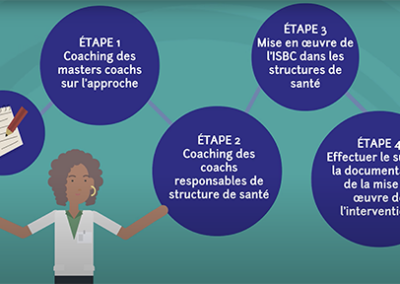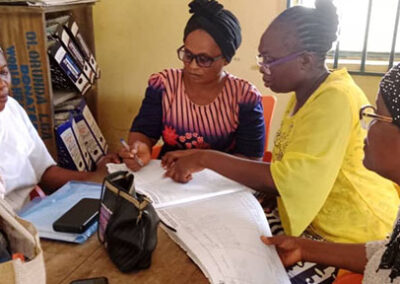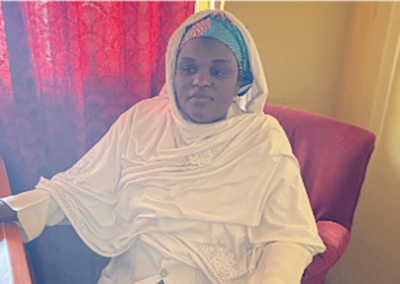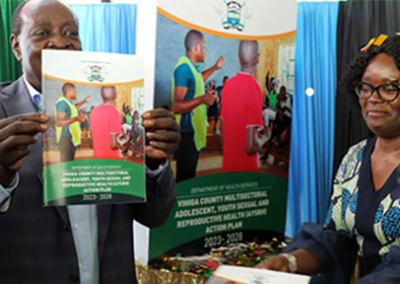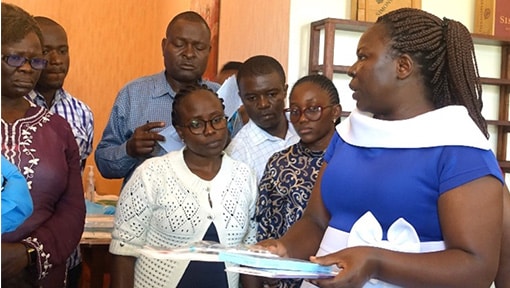
A mentor explains various contraceptive methods using the Ministry of Health training package.
The Challenge Initiative (TCI) has supported seven counties in Kenya to enhance access to quality reproductive health services by training and mentoring healthcare providers in postpartum family planning (PPFP). Women in their first 12 months postpartum often receive insufficient attention from healthcare systems, even though unintended pregnancies can pose significant health risks. The integration of modern contraception services during childbirth significantly boosts postpartum contraceptive use, potentially reducing unintended and closely spaced pregnancies.
Studies have shown that 95% of women in low and middle-income countries want to avoid pregnancy in the next two years, but 70% are not using contraception. Connecting PPFP with timely, accessible, and quality services is key to addressing this gap. This opens a need for providers who are able to confidently provide guidance and access to modern contraception to their patients.
With TCI’s support, seven counties (Bungoma, Busia, Nakuru, Narok, Siaya, Kajiado, and Trans Nzoia) expanded access to quality reproductive health services by increasing the competence and confidence of healthcare providers who deliver the bulk of care to the region’s pregnant women, mothers, and children.

A classroom set up for a postpartum practicum session.
PPFP is a skilled practice that requires specific training and direct advising for skills transfer. TCI worked directly with counties to expand this mentorship hosting sessions in 130 health facilities. The PPFP sessions, which include theory and practical training, aim to equip providers with the skills and confidence needed to offer effective family planning services in the postpartum period. The sessions took place over three days, with participants spending two days learning theory before practicing on models in a facility setting.
Callen Ateka is the Reproductive Health Coordinator for Nyamira County that received coaching in PPFP. Ateka shared:
Every opportunity is very crucial. We have to equip health care providers at all service delivery points to offer quality family planning services. This requires a holistic approach for sustained improvements – one such intervention is the continuous hands-on learning with frequent and supervised practice.”
Sessions adapt the use of humanistic models and hands-on clinical practice. All the mentorship topics are presented in units; as such, a unit can be used or adapted by the mentor to address the specific needs of the participants. The Ministry of Health has developed a PPFP training package and guidelines, deploying master trainers who conduct three to five sessions each to equip as many reproductive healthcare workers with family planning administration and counseling skills.
Dr. Michale Milimu, a Busia County Medical Officer, learned about PPFP management (theory) during medical school. However, he never had the opportunity to practice the necessary skills in the classroom. He has no doubt that the lessons he learned from a TCI coaching session will have a lasting impact on his ability to provide quality PPFP:
Under the mentorship of Callen, my confidence and ability to both counsel and provide postpartum family planning will improve.”
These skills-building programs have ultimately improved the quality of care and increased access to family planning services, and there are plans to scale these efforts to reach more communities in the future. Mentors like Ateka and Kipema Ole Punyua play crucial roles in this initiative, ensuring that healthcare workers receive ongoing support and guidance. Punyua, a midwife nurse at Kajiado County and an experienced national-level mentor, has advised fifteen healthcare providers in his county. Punyua stated:
I thank my mentors and TCI for their efforts in providing opportunities such as this and passion in saving the lives of mothers and children.”
Punyua regularly assesses the capacity of health facilities to provide quality family planning services. These assessments have revealed significant variations in the quality of care among facilities, with some having highly skilled staff and adequate equipment, while others face challenges such as staffing shortages or skills gaps. In addition to assessments, Punyua maintains an active WhatsApp group to keep in regular contact with mentees, ensuring they receive timely and accurate PPFP information. Furthermore, Punyua had the opportunity to participate in Ministry of Health meetings to review and update Kenya’s postpartum training guidelines and reporting tools.
Overall, the healthcare providers who participated in the program reported that they felt more capable of initiating PPFP conversations with their patients. Beryl Otieno, a nurse who works as a reproductive coordinator for Ugenya sub-county in Siaya, acknowledged:
I didn’t know how to insert a non-hormonal Intrauterine Contraceptive Device (IUCD), but at least now before a mother leaves my facilities I will be able to offer the service.”
Getrude Sagelo, a nurse at Busia County Hospital, will be able to apply her newfound skills in her role as a tutor at a local nurse training school. Sagelo is very proud that no opportunity will be missed with her newfound confidence. Previously, Sagelo and her team would refer such cases to other health facilities, with only five deliveries out of 30 receiving family planning guidance. She believes that her colleagues who have now gone through this mentorship program will feel motivated and increase the number of women accessing modern contraception. She is excited to share this knowledge and experience gained from her mentorship in providing PPFP.
Leaders in county health management teams have already committed to sustaining these healthcare mentorships, and both the governments of Siaya and Busia have stated that they plan to learn from the mentorship approach and scale it up in the future in other program areas.
Peter Kagwe, TCI’s program lead in Kenya, is optimistic. Looking ahead, he asserted:
I hope the mentees will be able to expand their skills at all the health facilities so that we are able to cover millions of mothers, children, and people (who are in vulnerable situations) and ensure their access to quality services. I’m hopeful that by next year, at this time, we will witness an expansion of our work in terms of better coverage, better access, and provision of high-quality PPFP services.”


